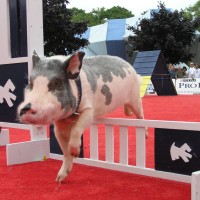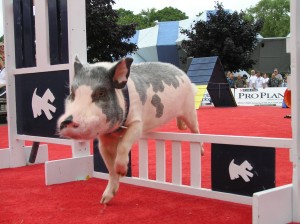

"If you think you can do a thing or think you can't do a thing, you're right." ~Henry Ford
As some of you may know, my son Ryan has just started playing organized hockey. He’s five and the kids he plays with can be anywhere from three to seven years old. Organized really only means that we have set times to play and have to pay a registration fee. Pretty much everything else is chaos, especially on the ice.
Watching that really reminds me of that first day of puppy class. All the new handlers shuffle into the training hall, bringing in an entourage of family members (husband, grandma, three kids, etc.) to watch how easy it’ll be to train their smart pup basic obedience. Ah the fun. But back to my story.
I was standing with several other parents watching the hockey practice before ours and I accidentally blurted out “There’s the pygmalion effect!”
I got more than a few quizzical looks, a somewhat awkward silence, and then finally someone said “Who’s a pig?”
“Well no ones a pig.” I said, “It’s the pygmalion effect.”
“What the heck is the pygmalion effect?” said the other parents in unison.
“I’ll show you. It’s happening right now, on the ice, as we speak.”
And this is what we saw…
On the ice, one coach was working with a group of players on a simple skating drill. Basically, the players were supposed to be skating around the outside of a circle, working on using the different edges on their skates.
One of the players was clearly better than the others and one was clearly struggling with the task. This is where the pygmalion effect comes into play. Watching how the coach interacted with each of the skaters, there were some subtle and some not so subtle differences.
First, with the strong skater, the coach spent more time one on one giving instruction. After realizing that the drill was too easy, the coach made it a little more challenging and encouraged the skater to push a little harder.
Second, with the weak skater, the coach provided almost no instructional feedback. There was encouragement but it wasn’t linked to any achievement or attempted achievement by the player. Simply a pat on the back for being there.
What was happening was that the coach identified immediately the better player and set higher expectations for them. Then followed up with better feedback to help them reach that higher level.
The coach also identified the lower skilled player and immediately reduced his expectations for them. This was followed up by less helpful coaching behaviours.
In the end what you get is both players meeting the expectations of the coach. It’s a special case of self-fulfilling prophecy. You can imagine the impact on development over the course of a season.
Now this was an overt example of the pygmalion effect and there were real differences between the skill levels of the two players. What’s important to recognize is that this can happen even without real differences in skill level or aptitude.
Just a quick example to demonstrate what I mean. From a research study in education, teachers were asked to spend a day with a class, give them a test, grade the test, and provide an evaluation of the class at the end.
Half the teachers were told that the class they would be working with was gifted, while the other half were told that the class they would be teaching had lots of problems.
When the teachers graded the tests and provided the evaluations, sure enough, the gifted class did excellent and the problem class did poorly. The twist in the study, which really emphasizes the impact of the pygmalion effect, was that all the teachers taught the same class. That’s right, there was no actual difference yet, the teachers changed their behaviour and evaluation of the class.
This is a very important effect to be aware of. As dog trainers and agility handlers, you coach your dog. You set the expectations for them and for yourself.
When you go to trials and you see the top dog and handler teams do you ever say to yourself, “Wow that team is good. We’d never be able to do that.” Or, “ Look at how they ran that course. I could never get my dog to do it that way.”
With those thoughts, chances are you won’t ever be able to do that and you’ll never train your dog to do it that way either. Stop those thoughts. Now that you know about the pygmalion effect, re-evaluate your expectations. Don’t limit yourself.
“Don’t lower your expectations to meet your performance. Raise your level of performance to meet your expectations. Expect the best of yourself, and then do what is necessary to make it a reality.” ~Ralph Marston
Leave A Reply (7 comments so far)
The comments are closed.
jane newman-ralph
13 years ago
interesting. do you feel children who are at the beginning of thier career learn from and have greater self expectations than those children who do not have an opportunity to watch players like Sidney Corosby?
How are they able to raise thier expections if they do not have the oppotunity to work with those who are better than they are?
Dianne
13 years ago
I have seen this. I coached youth soccer. One year I had U10 team of boys. At that age the skill levels were everywhere. I knew most of the boys. I had one young man who was not the most athletic kid and had always been stuffed in the back corner on defense. He told me he was not good, his mom told me he wasn’t very good. At the first game I but this boy in at center forward. The roar for the parents of the star players was unbelievable.The new center forwards mom was shocked. By the end of the season this kid could play! I remember see his mom in tears of joy when he scored. You get what you expect! We also won the end of season tournament and we had fun first! I also coached a girls team that summer and they won too.
Noeline
13 years ago
Great – I agree whole heartedly
Sarah
13 years ago
John – thank you for this post. As a trainer it provides some great insight into how we may approach our classes. I’ll certainly keep this in mind the next time I’m in front of a class as well as when working one on one with students.
Gisela
13 years ago
Excellent post, thanks for the reminder!
Merka
13 years ago
What an interesting article. By the sounds of it, I am getting what I expect. I see where I have to change.
MaryVW
13 years ago
Very insightful and definitely something I will keep in mind while training my own dog as well as when teaching group classes. I always try to be fair with my time but this is an entirely different angle.